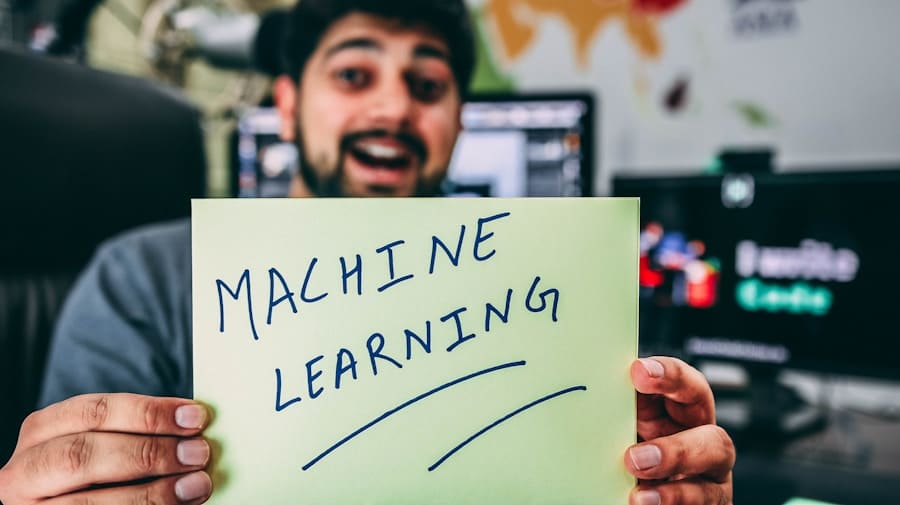In recent years, the educational landscape has undergone a significant transformation, largely driven by advancements in artificial intelligence (AI). The rise of AI-powered personalized learning represents a paradigm shift in how individuals acquire knowledge and skills. Traditional educational models, often characterized by a one-size-fits-all approach, are increasingly being replaced by tailored learning experiences that cater to the unique needs, preferences, and learning styles of each individual.
This shift is not merely a trend; it reflects a deeper understanding of how people learn and the potential of technology to enhance that process. The proliferation of data analytics and machine learning algorithms has enabled educators and organizations to create highly customized learning pathways. By analyzing vast amounts of data on learner behavior, preferences, and performance, AI systems can identify gaps in knowledge and recommend resources that are most likely to resonate with each learner.
This level of personalization not only enhances engagement but also improves retention and mastery of content. As a result, AI-powered personalized learning is becoming an essential tool for both academic institutions and corporate training programs, paving the way for more effective and efficient learning experiences.
Key Takeaways
- AI-powered personalized learning is on the rise, revolutionizing the way individuals learn and advance in their careers.
- AI-powered personalized learning works by using algorithms to analyze individual learning styles and preferences, tailoring content and delivery to optimize learning outcomes.
- The benefits of AI-powered personalized learning for career advancement include increased engagement, improved retention, and the ability to learn at one’s own pace.
- Implementing AI-powered personalized learning in the workplace requires investment in technology, training, and a shift in organizational culture to embrace a more personalized approach to learning.
- Overcoming challenges in AI-powered personalized learning involves addressing concerns about data privacy, ensuring inclusivity, and managing the potential for algorithmic bias.
How AI-Powered Personalized Learning Works
At the core of AI-powered personalized learning is the ability to harness data to inform instructional strategies. Machine learning algorithms analyze data from various sources, including assessments, quizzes, and even user interactions with learning materials. This analysis allows AI systems to create detailed learner profiles that capture individual strengths, weaknesses, and preferences.
For instance, if a learner consistently struggles with mathematical concepts but excels in visual arts, the AI can adjust the curriculum to provide more support in math while allowing the learner to explore creative projects that reinforce their strengths. Moreover, AI systems can adapt in real-time, responding to learners’ progress as they engage with the material. If a student demonstrates proficiency in a particular topic, the system can accelerate their learning by introducing more advanced concepts or challenges.
Conversely, if a learner is struggling, the AI can offer additional resources or alternative explanations tailored to their learning style. This dynamic adaptability is a hallmark of AI-powered personalized learning, ensuring that each learner receives the support they need precisely when they need it.
Benefits of AI-Powered Personalized Learning for Career Advancement

The implications of AI-powered personalized learning extend far beyond academic achievement; they play a crucial role in career advancement as well. In today’s fast-paced job market, continuous learning and skill development are essential for professionals seeking to stay relevant and competitive. AI-driven personalized learning platforms empower individuals to take charge of their professional development by providing access to tailored resources that align with their career goals.
For example, a marketing professional looking to enhance their digital skills can receive customized training modules focused on SEO, social media marketing, or data analytics based on their current expertise and desired career trajectory. Furthermore, personalized learning fosters a culture of lifelong learning within organizations. Employees are more likely to engage with training programs that are relevant to their specific roles and aspirations.
This engagement not only leads to improved job performance but also enhances employee satisfaction and retention. Companies that invest in AI-powered personalized learning initiatives demonstrate a commitment to their workforce’s growth, which can significantly impact overall organizational success. By aligning employee development with business objectives, organizations can cultivate a more skilled and adaptable workforce ready to meet the challenges of an ever-evolving marketplace.
Implementing AI-Powered Personalized Learning in the Workplace
Implementing AI-powered personalized learning in the workplace requires a strategic approach that encompasses technology integration, stakeholder buy-in, and ongoing evaluation. Organizations must first assess their existing training programs and identify areas where personalization can enhance effectiveness. This may involve selecting appropriate AI tools that align with organizational goals and employee needs.
For instance, companies might choose platforms that offer adaptive learning technologies capable of analyzing employee performance data to deliver customized training experiences. Once the technology is in place, it is crucial to foster a culture that embraces continuous learning. Leadership should actively promote the benefits of personalized learning and encourage employees to take ownership of their development journeys.
This can be achieved through workshops, informational sessions, or pilot programs that showcase the effectiveness of AI-driven training solutions. Additionally, organizations should establish feedback mechanisms to gather insights from employees about their experiences with personalized learning initiatives. This feedback can inform ongoing improvements and ensure that the training remains relevant and impactful.
Overcoming Challenges in AI-Powered Personalized Learning
Despite its numerous advantages, the implementation of AI-powered personalized learning is not without challenges. One significant hurdle is the potential resistance from employees who may be skeptical about new technologies or fear that AI could replace human instructors. To address these concerns, organizations must emphasize the complementary role of AI in enhancing the learning experience rather than replacing traditional teaching methods.
By positioning AI as a tool that empowers employees rather than diminishes their roles, organizations can foster a more positive attitude toward personalized learning initiatives. Another challenge lies in data privacy and security. The collection and analysis of personal data raise ethical concerns regarding how this information is used and protected.
Organizations must prioritize transparency in their data practices and ensure compliance with relevant regulations such as GDPR or CCPImplementing robust security measures to safeguard employee data is essential for building trust in AI-powered systems. By addressing these challenges proactively, organizations can create an environment conducive to successful implementation and adoption of personalized learning solutions.
The Future of AI-Powered Personalized Learning in Career Advancement

Enhanced Training Experiences
This evolution will enable organizations to create increasingly tailored training experiences that not only address current skill gaps but also anticipate future needs based on industry trends and emerging technologies.
Immersive Technologies for Career Advancement
Moreover, the integration of virtual reality (VR) and augmented reality (AR) into personalized learning experiences holds significant potential for career advancement. These immersive technologies can provide realistic simulations that allow employees to practice skills in safe environments before applying them in real-world scenarios.
Increased Accessibility and Affordability
As these technologies become more accessible and affordable, they will further enhance the effectiveness of AI-powered personalized learning initiatives.
Success Stories of AI-Powered Personalized Learning in Career Advancement
Numerous organizations have successfully implemented AI-powered personalized learning initiatives that have led to significant career advancement for their employees. One notable example is IBM’s use of its Watson AI platform to create personalized development plans for its workforce. By analyzing employee skills and career aspirations, Watson recommends tailored training programs that align with both individual goals and organizational needs.
This approach has resulted in increased employee engagement and improved performance metrics across various departments. Another success story comes from AT&T, which has embraced personalized learning as part of its broader strategy to upskill its workforce in response to rapid technological changes. The company developed an online platform called “AT&T University,” which leverages AI algorithms to curate personalized learning paths for employees based on their current roles and future career aspirations.
This initiative has not only enhanced employee satisfaction but has also positioned AT&T as a leader in workforce development within the telecommunications industry.
Ethical Considerations in AI-Powered Personalized Learning
As organizations increasingly adopt AI-powered personalized learning solutions, ethical considerations must be at the forefront of discussions surrounding implementation. One primary concern is ensuring fairness and equity in access to personalized learning opportunities. Organizations must be vigilant about avoiding biases in algorithmic decision-making processes that could disadvantage certain groups of employees based on factors such as gender, race, or socioeconomic background.
Additionally, transparency regarding data usage is crucial for maintaining trust among employees. Organizations should clearly communicate how data is collected, analyzed, and utilized within personalized learning systems. Providing employees with control over their data—such as options to opt-out or request deletion—can further enhance trust and foster a positive relationship between employees and the organization’s learning initiatives.
By prioritizing fairness, transparency, and employee engagement, organizations can harness the full benefits of personalized learning while fostering an inclusive environment conducive to growth and development.
In a recent article on ENICOMP, they discuss the innovative features of the Samsung Galaxy S23 in their review “Samsung Galaxy S23 Review”.
Both articles showcase how technology is revolutionizing various aspects of our lives, from education to entertainment.
FAQs
What is AI-powered personalized learning?
AI-powered personalized learning is a method of education that uses artificial intelligence to tailor learning experiences to the individual needs and preferences of each student. This approach utilizes algorithms to analyze a student’s strengths, weaknesses, and learning style, and then delivers customized content and feedback to optimize their learning.
How is AI-powered personalized learning enhancing career advancement?
AI-powered personalized learning is enhancing career advancement by providing individuals with targeted and relevant skills training. By identifying each learner’s specific needs and delivering personalized content, AI-powered systems can help individuals acquire the skills and knowledge necessary to advance in their careers and pursue new opportunities.
What are the benefits of AI-powered personalized learning for career advancement?
The benefits of AI-powered personalized learning for career advancement include increased efficiency in learning, improved retention of knowledge, and the ability to acquire relevant skills that are directly applicable to one’s career goals. Additionally, personalized learning can help individuals stay competitive in their fields and adapt to the rapidly changing demands of the workforce.
How does AI-powered personalized learning adapt to individual learning styles?
AI-powered personalized learning adapts to individual learning styles by using data analytics and machine learning algorithms to assess how each student learns best. This may include analyzing factors such as preferred learning methods, pace of learning, and areas of strength and weakness. The system then tailors the content and delivery of learning materials to best suit the individual’s needs.
What are some examples of AI-powered personalized learning tools?
Examples of AI-powered personalized learning tools include adaptive learning platforms, intelligent tutoring systems, and personalized learning management systems. These tools use AI algorithms to analyze student data and deliver customized content, feedback, and recommendations to support individualized learning experiences.

